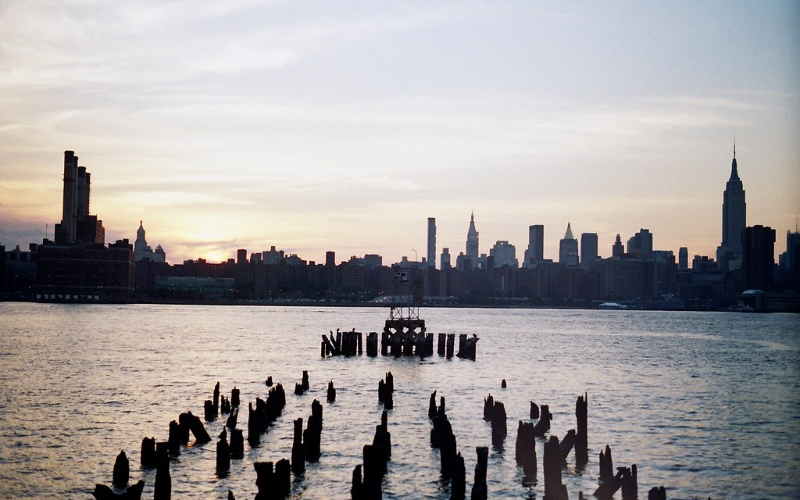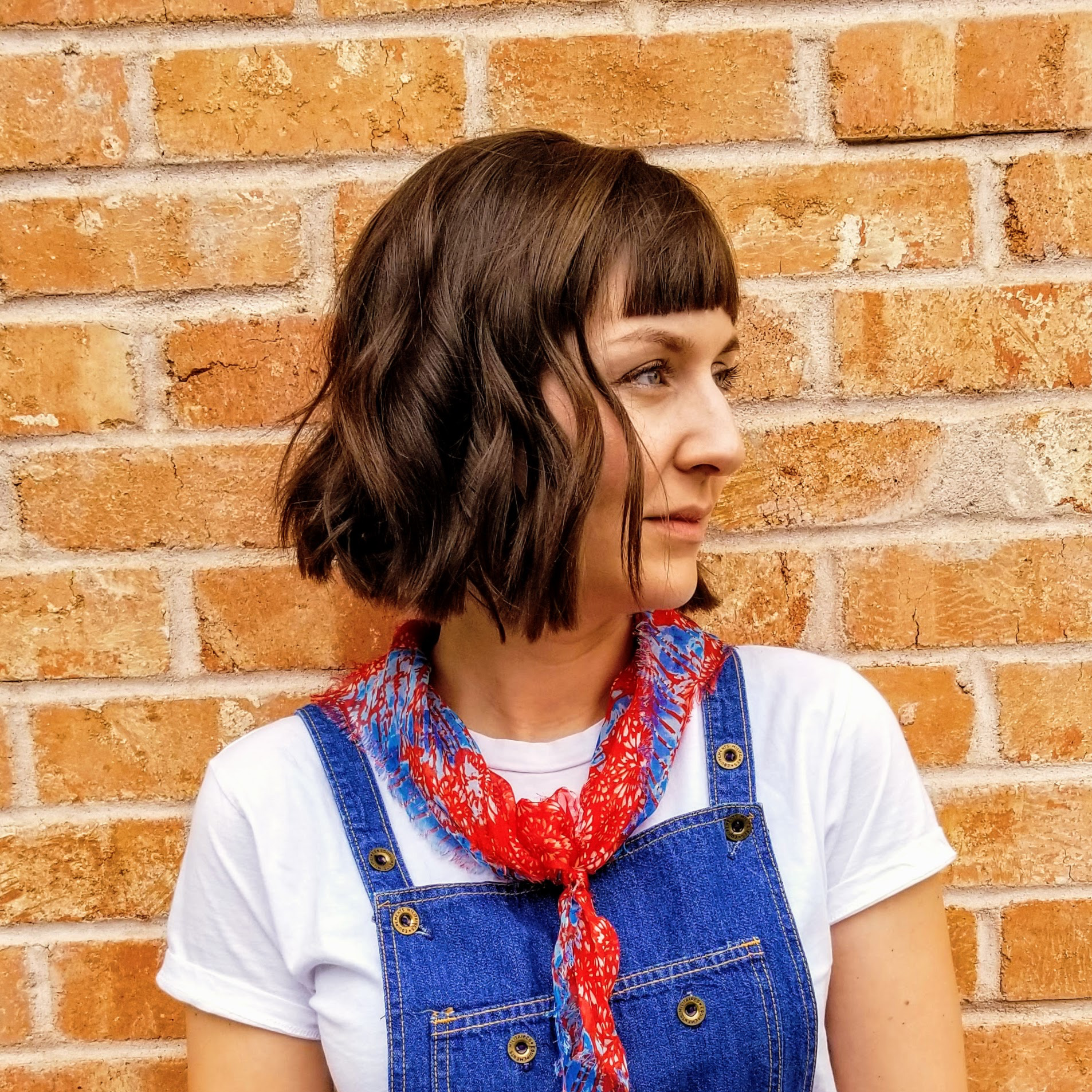Raymond
Shannon McGarvey
Excerpt from “Raymond”:
Had it not been for the photographer David LaChapelle or a chance encounter at a 2011 art opening in Midtown Manhattan, I wouldn’t have met Raymond. In person, at least. Prior to this we were engaged in a brief, shockingly chaste online conversation punctuated by the bizarre discovery that we both shared the same Genesis ringtone.
I first spotted Raymond in the beer line, adjacent to an elaborate paper chain of nude male cut-outs draped from the ceiling. He looked different in person, like a shitty Xerox copy of himself; softer and toothier. I recognized the doey glow of his eyes instantly, in the same way one might spontaneously recall a dream from the night before: in a lightning burst of clarity and confusion. It was that paradox which possessed me to make an introduction despite the near certain embarrassment of publicly acknowledging from whence we came.
In those days, online dating was like the Wild West: lawless, largely unexplored, and filled with an exquisite lore—precisely what lured the City’s freaks to trawl the bowels of the Internet on the off-chance of finding love or free dinner or hand-jobs (mostly hand-jobs). It wasn’t a place for people like us. At minimum, it wasn’t something to acknowledge before the discriminating eyes of the beer line, beyond which lay a room of bygone club kids, half-dressed D-List celebrities, and stalwart Michael Alig disciples. Indeed, it was an odd stage to perform an introduction to anyone.
I was halfway to Raymond when I got caught behind a tiny man wearing platform boots and a cloth diaper. His frizzy orange wig smelled like Aussie brand hairspray, which distracted me with sense memories from my awkward adolescent years—a visceral audiovisual montage of spraying a fan of peacock-like bangs while singing falsetto to Mariah Carey “Dreamlover”—and ultimately made me lose my nerve. I decided to forgo a direct introduction and instead linger silently in the background, mere steps behind Raymond, awaiting a more organic, seemingly spontaneous meeting; one born from real life circumstance and not just cyber entrails.
Up close, he was much shorter than I imagined. I was six feet tall (five-ten-and-a- half, according to my dating profile) and at least half-a-face taller than Raymond. Honestly, it didn’t bother me much. I was used to towering over men and often employed small optical illusions—an ambiguously flat shoe or a comically oversized bag—to distract from my height. The bag trick always worked, in that it did actually make me appear smaller but it was entirely impractical when it came to actually finding things. Like my phone, for example, when it spontaneously rang while I was creeping behind Raymond. My ringtone was unmistakable. It was the 1986 smash hit “Invisible Touch.”
She seems to have an invisible touch yeah
She reaches in, grabs right hold of your heart
The sound of my phone called to Raymond from the cavernous abyss of my bag. It was our siren song. I panicked and dove my hand inside my purse, ransacking its contents blindly: tampon, fountain pen, tampon again, tangled mess of ear buds —god dammit. The gated drumbeat dropped and the chorus crescendoed. I felt very hot.
She seems to have an invisible touch yeah
It takes control and slowly tears you apart
Thankfully, whoever was calling (my mother for the fourth time that day) had the human decency to finally hang up. It was too late, though. Raymond heard the song—all of it—and had already craned his neck to investigate the source. He did a quick double-take when he saw me, as if his thinking brain had not yet caught up with the what-are-the-chances of the moment. Our eyes met with a wild, bewildered look, then a timid, almost shameful recognition.
I paused for a moment with some uncertainty and then leaned into his space with a small, nearly undetectable smile. “Raymond,” I loud-whispered, “it’s me.”
***
Unlike myself, Raymond had all the marked characteristics of a charming dork: little self-awareness, painfully soft-spoken, and riddled by a profoundly dumb sense of humor. He had the fashion sense of Josh Baskin in Big; of a prepubescent boy suddenly transformed into adulthood. He worked at Marvel Comics. He could perform the entire Ian Malcolm ethics monologue from Jurassic Park verbatim—complete with table slaps—without even the slightest glimmer of irony. It was clear his Jeff Goldblum impression had been skillfully crafted and honed over time.
On our first date, Raymond wore an unseasonal flannel shirt with the top three buttons undone. He was undressed just enough to reveal a patchy collection of chest hairs that peeked from his neckline like a bunch of tiny question marks. He took me to Coney Island to see the freak shows, which was an appropriate gesture if not only an offering to the gods of our strange beginnings. We paid an emaciated old biker lady three dollars each to see “real freaks of nature.”
“What’s the difference between real freaks and fake freaks?” I asked. Raymond laughed but I was being sincere.
She looked like her name could have been Deb or Trish, she was haggard, and clearly hated these kinds of questions, which came across in her raspy almost unintelligible Brooklyn accent.
“Probably the real part, Hun,” she coughed.
Maybe it was her convincing demeanor: a faded “eat shit” tattoo on her forearm, her well-worn smoker’s growl, or the fact she was wearing Transitions lenses—whatever it was, I believed her. She also appeared to take some small personal pleasure in persuading us, like she had just watched us drive our lemon off the lot.
Once inside, we found a small group of teen boys drinking Four Loko beside a large pit in the floor. When I reluctantly approached and peered inside, all I saw was a potbelly pig wearing a cockeyed bowtie and tiny top hat. At the sight of each new visitor, he ran circles around his pen, leaping from the walls and snorting. I wondered if those boys had given him Four Loko. I told Raymond we’d been gyp’d. He said that was an offensive thing to say about gypsies.
Afterward, we wandered north to Surf Avenue, past the rickety wooden spires of the Cyclone toward Ocean Parkway and into the Russian nether regions of Brighton Beach. We ate borsch and rugelach and loitered in an alleyway outside an opulent, golden banquet hall where, I swear, I saw Viggo Mortensen unloading a box truck. I pretended to be a Moscow mail-order bride named Olga and spoke with “vetty theek ro-shan ahk-sent.”
That evening, Raymond invited me to his best friend Keith’s performance art piece in the Lower East Side. There were about 30 of us packed into a brightly-lit black box theater. Keith’s parents—a mild-mannered, monochromatic, aging couple from suburban New Jersey—timidly introduced themselves before asking the audience to place cut pieces of our hair in a Protestant-style offering dish they passed around the room. When the last lock was snipped, their son walked on stage. Keith was a scrawny, skeletal half-boy, prematurely bald, wild-eyed, and largely naked for the purpose of the show. We watched him scream at masked representations of himself, his high school gym teacher, and an ex-girlfriend on stage. At the climax—the denouement, he shaved a collie, wrapped himself in double-sided tape, and rolled through a mélange of dog and audience hairs. In the final scene, he knocked himself unconscious and sprawled motionless across the stage floor like a giant, man-sized dust bunny. In the silence, I heard his mother whisper to his father.
“Do you think he’s going to be OK?”
At the end of the night, Raymond and I made out at a metal bar in East Williamsburg, beneath the glow of an upside down neon marijuana leaf. Skid Row’s “18 and Life” blasted from a speaker near our heads. We weren’t teenagers but it sure felt like it.
***
I’d been listening to a lot of Peter Gabriel, specifically the mid-eighties album So, which had transformed into my near constant musical companion. I was especially enamored with the record’s sixth track “Big Time,” even though the disembodied opening “HI, THERE” always managed to inexplicably startle me despite how many times I’d heard the song.
I listened to “Big Time” on the walk from the G Train to Raymond’s apartment, down the uneven tree-lined sidewalks of South Slope. A mid-June breeze blew in from the East River, cool and thin like a fitted sheet stretched tight over Brooklyn. It was Father’s Day, our next date, and all the rotten smells of summer were still just a promise: the sugary stench of human piss on the subway platform, a swath of wet heat and vehicle exhaust in my eyes, leaning cathedrals of soured trash on every street corner—these were the aspirations of late spring in New York City just before the turning of the season.
Raymond lived in a modest brownstone not too far from Prospect Park. It was a poor man’s Huxtable-style house with a four-step stoop and steel garden fencing caked in decades’ worth of chipped black paint. He lived in a ground level apartment with two absentee roommates and an elusive black cat named Kevin. According to Raymond, Kevin had turned into a veritable recluse after enjoying some minor success on several YouTube funniest cats compilations. Although his Facebook presence was still quite vibrant, he now enjoyed a quiet life of virtual anonymity. This might explain why Kevin darted ahead of me down the hallway and disappeared under Raymond’s bed. We followed him into the bedroom and Raymond closed the door.
“Can I show you something?” Raymond asked.
For a moment, I thought he might show me his dick. You never know. I sat down on the edge of his squeaky metal-framed bed and crossed my ankles.
“Sure.”
Raymond kneeled on the floor in front of me and crawled beneath the bed. I could feel his head hit the mattress frame as he rifled through whatever was down there. I heard him call Kevin an asshole. When he re-emerged, he was holding a plastic baggie with a wad of spindly dehydrated mushrooms inside. He tossed it on my lap and looked at me with a strange innocence. But this was no accident. Raymond was asking me, a strange woman he met online, a person he’d cumulatively spent maybe ten hours knowing, if I wanted to engage in illicit drug use; a psychedelic mushroom trip.
I paused for a moment and swallowed, slowly taking in the room. There was a vintage poster of the Macho Man Randy Savage taped above his bed. I spotted a pile of old MacGyver VHS tapes in the corner. This wasn’t meant for a lady to see, I thought as I looked down at the magic mushrooms resting gently upon the jean penis (“jeanis”) of my shorts. Good thing I’m not a lady.
“Fuck it,” I shrugged and tore open the bag, “let’s get weird.”
***
By the time we reached Prospect Park, I’d come to terms with the fact my insides had mutated into magic grow capsules and were expanding into a colorful spongy zoo. It’s the mushrooms, I thought to myself, it isn’t real.
“What did you say?” Raymond turned to me with a toothy, dopey smile. The sun washed over his face in a glistening, copper glow.
I wondered for a moment if he could hear my thoughts. But then I realized I was just extraordinarily high. My gaze fell into the rounds of his cheeks, shiny and tight like the flesh of a plum. The blue in his eyes were all pupil, all rabbit hole.
This was when I decided it was best to stop making eye contact with Raymond. Taking mushrooms with anyone is a series of psychic trust falls: stay light, keep moving, don’t look at your hands—for the love of god, never make eye contact. I didn’t know Raymond well or at all, really, but I knew I’d just entered into a magical agreement with him, one of which I was bound for the next few hours. There was no way to back out. There was only the forward motion of falling face first.
After some time lost wandering, we lied down in a clearing beside the Prospect Park Carousel and listened to a bombastic rendition of Scott Joplin’s “Kismet Rag” play on a loop. I sat up and took it all in: the sun beating down on the tops of our heads, the technicolor grass, thirty-something men wrestling with umbrella strollers, our creamy white legs outstretched side-by-side like piano keys. We stayed there a while until we suddenly became aware of our staying, at which point one of us suggested that we spontaneously leave.
We took long city strides out of the park, headed north past the neoclassic columns of the Brooklyn Museum, up Flatbush Avenue, under the arch of Grand Army Plaza. Raymond narrated with topical facts about the Revolutionary War. My brain blew gently in the wind.
This is my natural state, I thought, this is who I am. A psychedelic separatist —an unbiased Daughter of the Revolution—roaming freely on the weekend streets of Brooklyn.
We hung a left on Atlantic Avenue and weaved west through the neighborhood grid of Boerum Hill, then north into the Heights. It was all coffee shops, children, or churches, and Raymond was an overzealous tour guide, pointing out every steeple along the way.
“They call this the Borough of Churches,” he said.
Indeed it was our weird place of worship and the cacophonous sounds of the city, our sacred hymn. A reggaeton beat bounced out of a parked gypsy cab and landed in my ear. I heard the cabby greet someone.
“Hi, there.”
I let out a small gasp. For a long moment, I was convinced that Peter Gabriel drove a gypsy cab in South Brooklyn. It was a monumental breakthrough. I felt validated on an otherworldly, cosmic level. I even had the sudden urge to bow my head, to genuflect—“pray to a big god and kneel in a big church.”
But our pace allowed for none of that. We had to keep moving and exploring, pushing toward the edge of Brooklyn, all the while secretly hoping for another celestial sign from Peter. When I tightened my jaw I heard the echoey sounds of “Hi, there” again, this time louder and on a maniacal loop inside my head, rattling around like a pinball behind my eyes.
This continued for at least two blocks until, by fate, I saw the gypsy cab again outside a basement cafe on Montague Street. The thing nearly ran me over before speeding off into the hazy neon horizon line of the East River. The cabby’s silhouette looked like an impressionistic Bob Dylan—all wayfarer and wild curl—pulled from the cover of Blood On The Tracks.
“Thanks a lot, dickhead!” Raymond threw his arms up at the vanishing cab.
“That is NOT Peter Gabriel,” I said with the same timbre of Maury Povich reading a paternity result.
“Who?”
It was then the world I’d created for us began to crumble. To my utter shock, Raymond had never heard of Peter Gabriel despite being a “fan” of Genesis. Furthermore, he’d never heard the song “Big Time” and, although we established he knew of Bob Dylan, Raymond could not appreciate the blurry dots I connected on Montague Street. All of this despite my sincere and earnest attempts to perform these songs extemporaneously, scavenging oblique references from the annals of popular culture. Raymond didn’t have a clue.
Suddenly, I felt sober to the moment, to the tenuous connection I’d built around a string of odd happenings: a Coney Island freak show, a lifeless man covered in fur, a Genesis ringtone. Until that moment, I’d remained blissful in a space of total compatibility with no real proof to back it up. I hadn’t once considered if we were actually compatible or if the sum of our parts even added up to anything at all.
I looked down at my watch. It had taken the length of one mushroom trip—approximately five hours—for the two of us to wander the circuitous route from South Slope to the edge of Brooklyn to a park bench on the Promenade. We sat in silence near the end of the esplanade and watched the sun set in shadows across the Brooklyn Bridge.
Raymond cleared his throat. “I need to tell you something.”
This was when he tells me about an estranged wife in Canada or gives the elevator pitch for his sex cult. “Okay?”
I’d become accustomed to men I hardly knew inexplicably trusting me with their deepest secrets. Most of the time (read: all of the time) it meant we were never going to see each other again. There was a comforting anonymity to these types of encounters, to having the face of a confessional screen.
“I lied. I don’t work at Marvel Comics,” Raymond looked down at his hands.
“Oh,” I said after a moment. “Ok.” Frankly, I hadn’t given much thought to what Raymond did for a living, outside of dim, dorky characterizations of him in my mind. I’d been too busy aggrandizing the odd details of our connection to think about such practical things.
“I used to,” Raymond looked like he was sweating, “But I got fired.”
I could’ve asked why he was fired but I didn’t care. Instead I nodded my head pityingly and patted the tops of his hands with a gentle “there, there.”
“I understand, Raymond,” I said, “I understand.”
Men are babies, my mother always told me. They need to be coddled and cared for, petted in a patronizing way. I hated that this had been so deeply ingrained in me; if only for the generational reach of it, the loneliness of always giving yourself away.
I turned my body back toward the water and straightened my shorts. I stared out at the city lights reflected on the river and thought about the Brooklyn Bridge, how nice it would feel to be so useful and seen. It was starting to get dark.
“You want some gum?” the sound of Raymond’s voice shattered my train of thought.
“No thanks,” I said as I watched him fold a stick of sugar-free watermelon chewing gum into his mouth. It smelled like a 7-Eleven Slurpee.
“What about these?”
Raymond dug into his pocket and pulled out two small pieces of peanut butter candy, the rectangular kind my grandmother used to keep in a glass jar on her coffee table. The thought of those orphaned cellophane-wrapped candies warm in his pocket, mingling with dryer lint and Kevin hair, equal parts horrified and endeared me—like much of our time together. I plucked a piece from his open palm for souvenir’s sake but ended up eating it on the way home, there in the communal privacy of the G train.
I clicked it behind my teeth for a while, sucking out the synthetic peanut butter flavor with my tongue, and then splitting it with a molar, grinding it in harmony with the gears of the train as we jerked forward, then steadily rolled back into darkness.
 Shannon McGarvey is a writer and TV producer living in Austin, Texas. She holds a postgraduate degree in Creative Writing from the University of Glasgow and received similar undergraduate training from Texas State University. Her writing has appeared in the Furnace Review, Merge, Temenos, Whisky Advocate, Austin American-Statesman, and more. Follow her on Instagram and Twitter @shannonmcgarvey
Shannon McGarvey is a writer and TV producer living in Austin, Texas. She holds a postgraduate degree in Creative Writing from the University of Glasgow and received similar undergraduate training from Texas State University. Her writing has appeared in the Furnace Review, Merge, Temenos, Whisky Advocate, Austin American-Statesman, and more. Follow her on Instagram and Twitter @shannonmcgarvey
Featured Image: “Manhattan Skyline” provided by Harold Navarro is licensed under CC BY-ND 2.0


No Comments